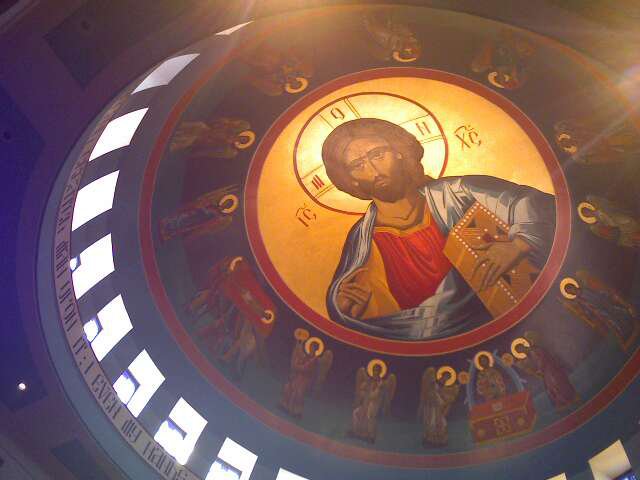The pastor asked how I was feeling, and, actually, I had wanted to talk with him, so I responded with about five minutes on how I was ready to give up on the parish, because all but one of the four clergy there (the two residents and the retired helpers) like to present their stupid unfunny comedy acts during the Holy Sacrifice of the Mass.
“Are we the comedy parish?” I asked rhetorically.
“Maybe we are.” He’s not going to change anything, and I’ll just go elsewhere, but I’ve done my duty.
Category: Uncategorized
I still think people should avoid TFP
A friend asked today:
Does anybody see any problem with one becoming a Rosary Rally Captain [in the…] Public Square Rosary Crusade operated by The American Society for the Defense of Tradition, Family and Property (TFP). Does anyone on [this list…] know anything about this organization?
I advise people to steer clear of TFP.
Most of its activity in the US seems to be in two areas: organizing protests against anti-Catholic manifestations in society, and exploiting anti-Catholic manifestations in society to raise funds.
TFP started out well, but degenerated for a long time into a personality cult for its founder Plinio Correa de Oliveira (now deceased); he claimed prophetic powers and a grandiose role for himself in world history and even in salvation history. His followers wrote hymns about him and devotional prayers about his mother (!).
I would compare the group to the Moonies: a personality cult using religious elements for political purposes.
Here are two articles about TFP:
One by a former member, John Armour:
http://catholicforum.fisheaters.com/index.php?PHPSESSID=48d48e0a68a48ae1ab6e40d8e6d44a18&topic=2649714.msg25491502#msg25491502
One by Rick Salbato, who writes about Catholic fringe movements:
http://www.unitypublishing.com/NewReligiousMovements/FatimaCult.html
For TFP’s official status: in Brazil, where it was founded, the bishops’ conference warned Catholics not to join or support it, in 1985. TFP defenders claim that this opposition stems from TFP’s opposition to then-trendy liberation theology.
However, traditionalists, including Lefebvrists, are equally adamant against the group. They got to see it up close when TFP cultivated relationships with them, until traditionalist leaders in Brazil such as the retired Bishop of Campos, Antonio de Castro Mayer, found out about Plinio’s secret doctrines. (See Bp. de Castro Mayer’s 1984 letter.)
Most people involved in TFP groups in the US, of course, including priests who might opine about it, have no idea of any of the above. It’s possible that the errors of the past have been eliminated in practice, but I think it would be better to organize Catholic lay apostolate in groups with no connection to the apparently heretical Plinio.
St. John the Baptist Byzantine-rite Cathedral, Munhall, PA

Is this how we are to treat our friends?
An acquaintance has posted this link in a couple of places: a young monk in Wisconsin, a convert taking a somewhat deflated view of the proposed Anglican-use Ordinariate, puts out this little welcome sign for other prospective converts:
Do you agree with this statement:
I believe that to join an Ordinariate is to promise before God that, when I am traveling and not able to attend an Ordinariate parish, under pain of mortal sin I will assist at a folk Mass with streamers and liturgical dancers, if that is all there is to be found, in order to fulfill my Sunday obligation.
Now, I’m all for the Sunday obligation, and believe you me, I’ve endured some poor music and odd liturgical proceedings for its sake, but the ‘profession’ which Brother Stephen demands above is really not constructive.
I came into the Church in 1980 — at perhaps the nadir of the liturgical barbarities — so I have probably suffered more for the faith at the doings of bad liturgists than young Brother Stephen has, especially now that he resides in a lovely Cistercian monastery. Is he really in a position to strike an inquisitorial pose and demand that other people promise now to accept aesthetic sufferings?
I remember from experience that prospective converts simply do take some time to go through the intellectual and volitional steps implied by becoming a Catholic. They consider various aspects: to accept points of Catholic doctrine, and recognize the authority of the Church, and finally agree to be obedient to the Church.
It is not up to us, their friends, to decide which issues they absolutely must deal with first, even though, in the end, a convert must accept everything that the Church authoritatively teaches (and prescribes) in order to be a good Catholic. We can trust the pastors of the Church to ensure that any new Catholics of Anglican heritage will have proper instruction on the Sunday obligation, but if we stick a finger in their eye now, as if to assert our superiority, it is not exactly a heroic act of charity.
Not a surprise
Once again, my distaste for weekly network TV shows is confirmed.
An episode of “Glee” came on — a show I’ve never watched — and the plot is apparently about a threat to abolish the school’s choir.
Who do the writers present as the bad guy of the episode? Who wants to do away with the group he formerly starred in? A “Christian” character, of course!
And to make the guy “worse”, they throw in some unrelated stereotypes too: he’s out to “convert” former choir members (it’s a dig at ex-gay ministries). And he sells big SUVs and says he doesn’t believe in global warming. That’s one of the ultimate heresies to Hollywood, apparently. I wonder whether this episode was written before Climategate blew up in the faces of the East Anglia and Penn State experts.
If the writers are so desperate for material that they have to resort to a cheap cliché, this show must have jumped the shark already in its first season.
Life is too valuable to waste any of it on this.
